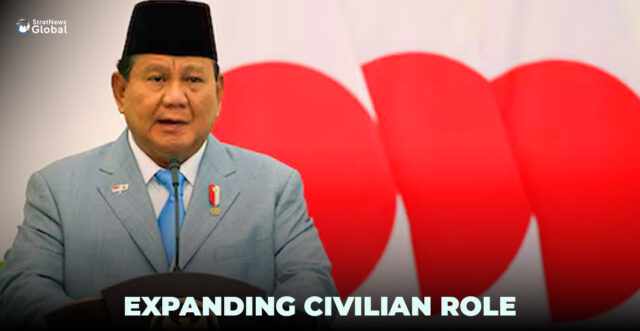Indonesia’s military will start producing medicines for public use under a new agreement, marking its latest move into civilian affairs since President Prabowo Subianto took office.
The president, a former defence minister and special forces commander, has expanded the powerful military’s role in civic affairs since taking office last year – including running much of his flagship project to serve free school meals.
In March, parliament, dominated by Prabowo’s coalition, also passed a revision to military law that allows more civilian posts to be occupied by soldiers, sparking protests by student and activist groups.
The moves have dismantled some of the safeguards put in place after authoritarian leader General Suharto was overthrown in 1998 and raised fears of a return to an era when the armed forces were allowed to crush dissent and dominate public life.
Defence Minister Sjafrie Sjamsoeddin late on Tuesday signed an agreement with the food and drug agency for laboratories operated by the army, navy, and air force, which previously supplied medicines for soldiers, to begin manufacturing drugs for public use.
Mass Production From October
“We are thinking of ways to lower the price even more so we could provide free medicines,” Sjafrie told reporters.
Mass production will begin in October, and the medicines will be distributed to villages across Indonesia at 50% below the retail price, Sjafrie said.
Military involvement is expected to curb the flow of illegal medicines and fight the “mafia” in the medical industry, said the drug agency’s head, Taruna Ikrar.
But rights groups have said that the agreement was unlawful as it brought serving military officials into civilian business positions — prohibited under military law.
“This is a symptom of how the government has shifted into authoritarianism,” said Usman Hamid from Amnesty International Indonesia.
The military and Prabowo’s office did not immediately respond to a request for comment.
The medicines will be distributed by 80,000 state-backed cooperatives launched by Prabowo on Monday, Sjafrie said.
Prabowo’s cooperatives were set up to boost economic activity and cut out middlemen by providing services directly to the general public, including giving loans and selling medicines and staple foods.
The defence minister has also signed another agreement with the health ministry to build hospitals staffed by military doctors and nurses in conflict areas, including Papua province, where a low-level insurgency has battled for independence for decades.
(With inputs from Reuters)





